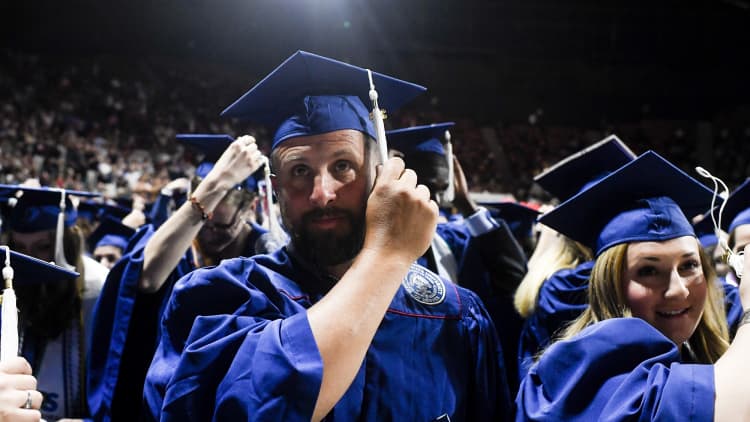Colleges across the country have begun to cancel classes among growing COVID-19, or coronavirus, fears. National Public Radio estimates that more than 600,000 students have been impacted.
One of the latest schools to shut its doors is Harvard.
On Tuesday, Harvard President Lawrence Bacow announced the school would transition to virtual classes for undergraduate and graduate students. He also said students would be asked not to return to campus following spring break and that the school would no longer be hosting non-essential gatherings of more than 25 people.
An email Harvard College Dean Rakesh Khurana sent that day clarified that students would be required to evacuate their dorms in five days. The move has highlighted the bold steps some schools are taking to address coronavirus — as well as the unintended impact of such actions.
"Students will be required to move out of their Houses and First-Year dorms as soon as possible and no later than Sunday, March 15 at 5:00 pm," reads Khurana's email. "We realize that leaving campus in short notice will be challenging for some of you."
Harvard enrolls nearly 20,000 undergraduate and graduate students, and 97% of undergraduate students live on campus for all four years. According to the most recent figures from Johns Hopkins, there have been 41 confirmed cases of coronavirus in the state of Massachusetts, where Harvard is located.
Khurana's letter goes on to suggest students consult with their resident dean if they need assistance.
"Though circumstances will require us to physically distance ourselves from each other, we are going to be innovative in finding ways to continue to engage as a community and to draw strength from one another," writes Khurana. "I have seen us come together and support each other with compassion during difficult times, and I am confident that we will do so now as we meet this new challenge."
Students, however, seemed less confident that they were prepared to take on the challenge.
Many Harvard students took to Twitter to express their frustration:
https://twitter.com/hakeemangulu/status/1237367253374398465?s=20
https://twitter.com/LailaTauqeer/status/1237363053282369536?s=20
https://twitter.com/melissann19/status/1237392956610375682?s=20
https://twitter.com/ChiomaOnuoha/status/1237370670276849664?s=20
Anil Bradley, a Harvard sophomore concentrating (the word Harvard students use in lieu of "majoring") in physics and computer science from Long Island, N.Y., says that he and his roommates were blindsided by the announcement.
"We were all in shock at the short notice," Bradley tells CNBC Make It. "I'm lucky enough to have a strong situation where my dad is able to drive up from New York and drive me home, but a lot of my friends who are low-income and rely on the university for housing and dining are having trouble with travel costs and even housing security."
Bradley expects a relatively smooth transition to taking his courses remotely except for one class, which is discussion-based.
"I'm not sure how that's going to work," he says, emphasizing his concern for other students. "The university has not been doing enough, and people very close to me are worried about being able to get home before the deadline."
Trey Rogers is a member of Harvard's senior class of 2020 and says while he understands the need for such public health measures, he is "devastated."
"It's important for all of us students to realize that we are not the ones who are most in danger of this virus, but staff workers in dining services, and the janitor staff and professors," he tells CNBC Make It. "They may be in the age group that's susceptible to the virus, and it would be really horrible for students to transfer this virus to the people who are taking care of us at the college."
"So I realize that it's probably the right thing for the college to do and to be especially safe," he says, "but it's devastating as a senior to know that I have to abort my college experience on this really sad note."
Bacow acknowledged that sadness for seniors in a statement.
"To our students, especially those of you graduating this year, I know that this is not how you expected your time at Harvard to end," he wrote.
As for his coursework, Rogers is skeptical that the school's plan to use Zoom video conferencing services, a cloud-based communication service, will compare to the small discussion-based classes he is accustomed to in his social studies concentration.
"It's really hard to think that this is not the end of our academic year because this Zoom thing feels a little bit like a last-minute fix for a problem that is not that easily fixed," he says.
Originally from Crawfordsville, Ind., Rogers says his mom is driving across the country to pick him up, but says it has been "chaos" for his peers who are more than a road-trip away from home. He describes a friend who is struggling to get a flight back home to Nepal and a professor who offered to loan students cash for transportation.
"For those people who are totally uprooted and have to, in four days, figure out how to get themselves halfway across the world, I have a lot of sympathy," says Rogers. "It's hard enough to get back to Indiana."
While in Indiana, Rogers plans to finish his senior thesis and finalize his professional plans for after graduation.
For now, "it's a lot of goodbyes," he says.
Like this story? Subscribe to CNBC Make It on YouTube!
Don't miss:



